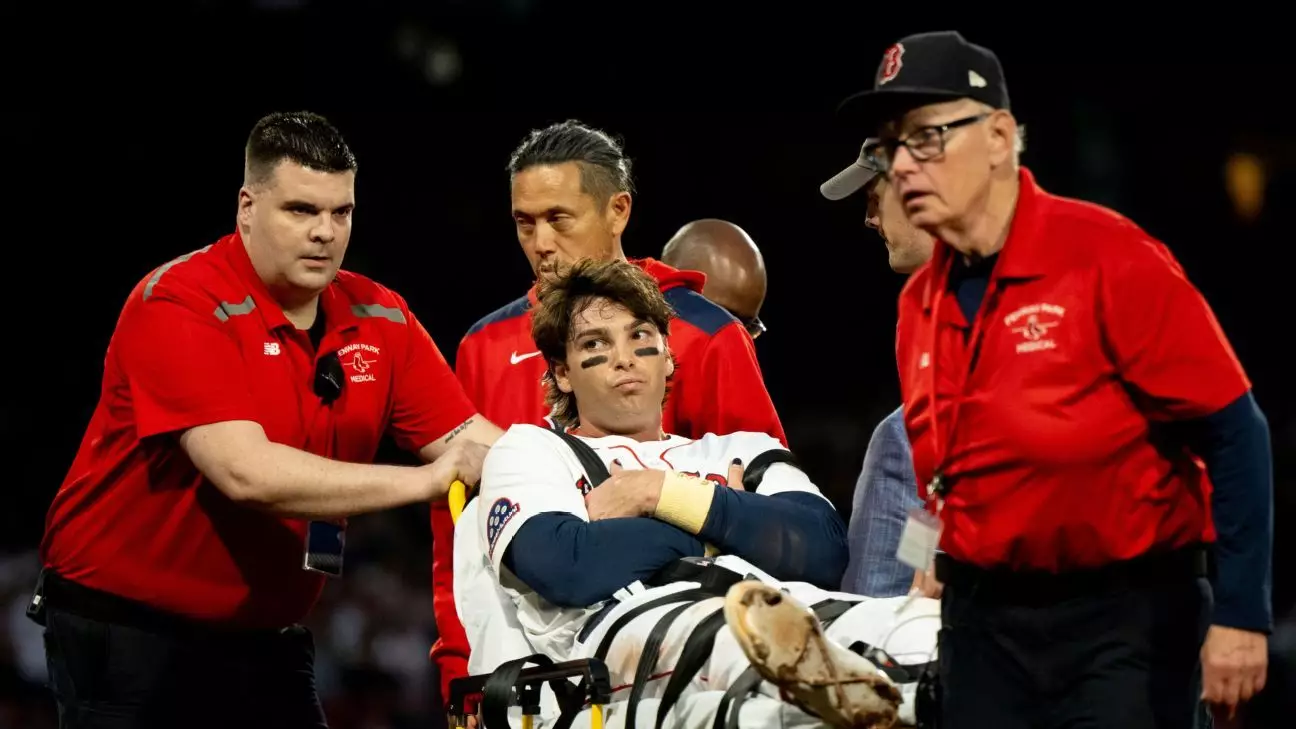In a heartbreaking turn of events, the Boston Red Sox have announced that their promising first baseman, Triston Casas, suffered a ruptured patellar tendon in his left knee, effectively sidelining him for the rest of the season. This devastating injury occurred during a seemingly innocuous moment—running to first base on a slow roller—yet it underscores the unpredictable nature of sports, where fortunes can turn in the blink of an eye. For a player like Casas, who was poised for a breakout season, this incident not only halts his playing career for now but also raises questions about how such injuries ripple through a team’s dynamics and strategy.
Casas’ injury transpired during a game against the Minnesota Twins, and its severity was apparent immediately as he fell awkwardly and was carted off the field. The grim announcement from the team following his surgery at Massachusetts General Hospital left fans and teammates alike reeling. The surgical procedure was overseen by Dr. Eric Berkson, with the Red Sox expressing their commitment to Casas’ quick recovery and well-being. This incident reveals the fragility of athletic potential; despite offseason preparation and dedication, a momentary misstep can lead to a season-ending injury.
The Impact on Team Dynamics
Beyond the immediate physical ramifications, the loss of a key player like Casas creates an emotional void within the squad. At just 25 years old, he was not only seen as a cornerstone of the infield but also as a burgeoning leader in the clubhouse. Chief Baseball Officer Craig Breslow articulated the profound sense of loss, acknowledging that while Casas struggled early in the season—with a batting average of merely .182—his presence was critical to the team’s cohesiveness and morale.
Manager Alex Cora’s sentiments reflect the emotional stakes involved. Having observed Casas’ dedication during the off-season, Cora highlighted the player’s commitment to his craft. While he envisioned the initial challenges in the batter’s box, the focus was not solely on statistics; it also hinged on the energy and stability he brought defensively. The team now shifts its focus to rehabilitation, aiming to ensure that when Casas returns, he will be even stronger and more resilient than before.
Strategies Moving Forward
With Casas out of the lineup, Cora has to navigate the immediate challenge of filling the first base position effectively. The acquisition of infielder/outfielder Abraham Toro from Triple-A Worcester suggests the team is prepared for short-term adjustments. However, this situation compels the Red Sox to think critically about their long-term prospects. The option of exploring external replacements becomes paramount not only for the immediate future but also for the team’s strategic planning moving forward.
The injury blurs the lines between addressing current needs and developing future talent. Though Cora reassured fans that there are no plans to shift other key players like Rafael Devers, the incident forces the organization to reassess its roster depth and potential trades. The dual focus on short-term fixes and long-term growth embodies the balancing act every front office must perform when faced with injuries.
Casas’ Personal Journey: A Test of Character
As Triston Casas embarks on his rehabilitation process, he finds himself at a crossroads where resilience will be tested. His perspective on the game—discussing the importance of remaining relaxed and composed—becomes even more pertinent in the context of adversity. This injury may serve as an unforeseen lesson in patience and personal growth, demonstrating that setbacks can often pave the way for a stronger comeback.
In a world often obsessed with immediate success, Casas exemplifies the belief that lasting achievement requires perseverance and fortitude. As he shifts his focus from playing to recovery, fans and teammates will undoubtedly be cheering him on, hoping that his journey through this difficult chapter enhances not only his physical capabilities but also his mental resolve.
In sum, the unfortunate injury of Triston Casas lays bare the transient nature of sports and the heartfelt connection between players and their teams. While this may signal a significant hurdle for the Red Sox, it also offers an opportunity for reflection, adaptation, and growth—not just for the player, but for the entire organization.


Leave a Reply